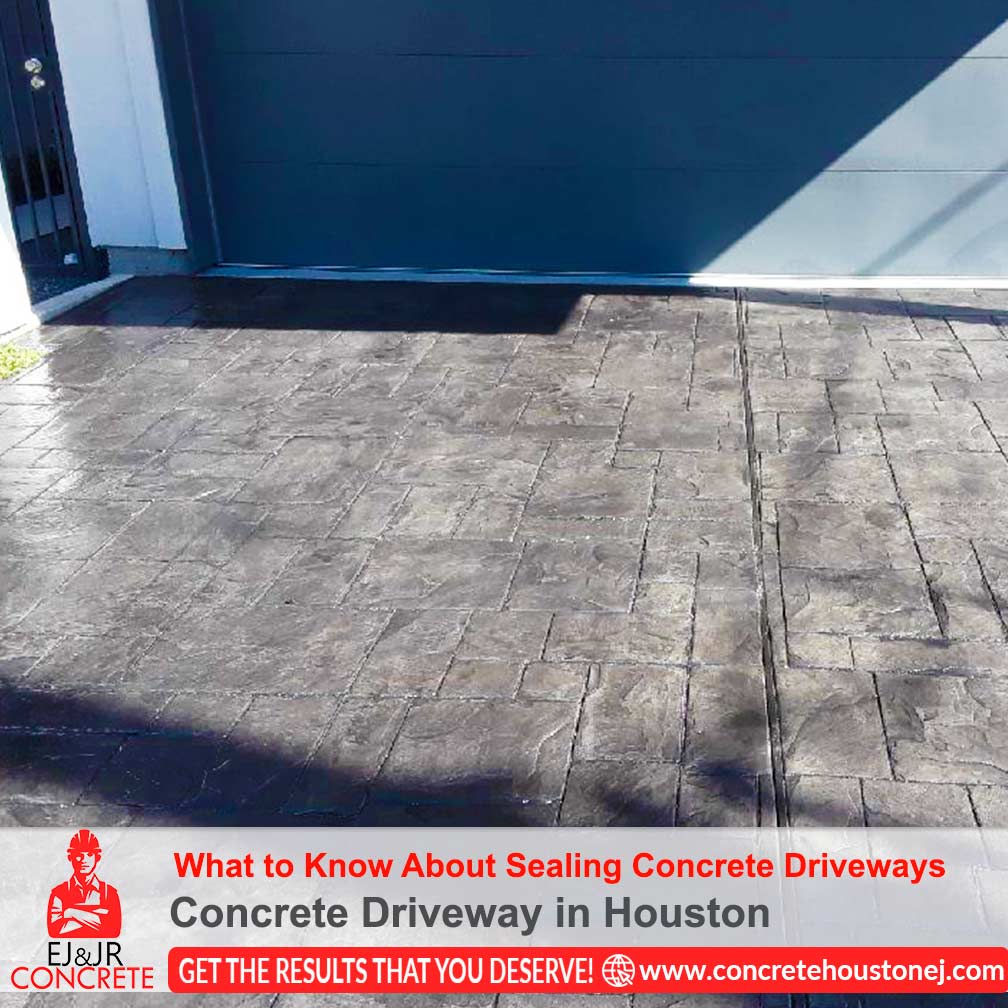What to Know About Sealing Concrete Driveways

There is considerable debate about if it is necessary to apply a sealer to concrete driveways and other concrete surfaces, and if so, how often it should be done. Aggressive marketing by the companies selling sealing products may be the reason behind the common belief that a sealer must be applied each and every year, but even skeptics agree that periodic sealing will help prolong the life of any concrete slab, whether it is a driveway, patio, pool deck, or sidewalk.
Concrete performs quite adequately if it is never sealed at all, but applying a good quality sealer every few years will extend its life and keep it looking good. This is especially true if you have a stained or etched concrete driveway or patio, or if you live in an area where winter road salt can eat away at the concrete.
Applying a concrete sealer is an easy project for a DIYer, and it will keep your concrete slabs looking good and potentially lasting longer.
Types of Sealers
Before you begin, be aware that there are different types of concrete sealer. It helps to know the difference between an acrylic resin-based sealer, an epoxy or polyurethane sealer, and a penetrating sealer.
- Acrylic resin-based sealers: Sealers that lay down a film of acrylic resin provide excellent performance for their cost. They may be blended with epoxy, polyurethane, or silicone to enhance the durability of the product, so read labels carefully. There are different types of acrylics, too, and some are better than others. Styrene acrylic is a lower-performance product that may turn yellow under direct sunlight. A better choice is a type known as virgin or pure acrylic resin, which will last longer and will not turn yellow.
- Epoxy or polyurethane sealers: These cost considerably more than acrylics, but the high costs do not really mean they are superior. They lay a thicker layer, so can be slippery, especially when coated onto a patio or walkway. These products also prevent the concrete from "breathing" moisture out of the concrete, which is a problem. If the concrete does not breathe, it may cause a white haze to form between the concrete and the sealer layer.
- Penetrating sealers: These products are made of specialty resins (silicones, siloxanes, and silanes) that penetrate into the concrete and form a chemical barrier to water, oil, and other common contaminants. Such products will be clearly labeled as "penetrating" sealers, and are a good choice where you want to protect surfaces against stains, such as in a garage or on a driveway.
The very best products will be available at professional concrete supply retailers. The inexpensive products offered at hardware stores and home centers tend to be intermediate-level sealers that provide adequate performance but will likely have a shorter useful lifespan than more expensive professional-grade sealers.
Gloss Levels
Like paints, concrete sealers are available in different gloss or shininess levels. You can choose from no-gloss, matte, satin, semi-gloss, gloss, and high-gloss options. Manufacturers categorize glosses on a scale of 1 to 100, with 100 representing the highest level of gloss.
- Solvent-based sealers: Gloss level of 80 to 100, produces a gloss to high-gloss surface
- Water-based sealers: Gloss level of 50 to 80, produces a matte or semi-gloss surface
- Penetrating sealers: Gloss rating of 0, produces a no-gloss surface
Be aware that solvent-based sealers tend to darken the surface of the concrete more than water-based sealers. Those marketed as "wet-look" sealers have a higher ratio of solids in the liquid. While some people like the look of wet-look sealers, others find them unnatural looking, especially on stamped, colored, or textured concrete surfaces like those used on patios and pool decks. However, some wet-look sealers also include coloring agents that can be used to stain a slab as well as seal it.
Source: thespruce
EJ & Jr Concrete is a family owned, all our work is guaranteed. No matter the size of your project, we are ready to do. Effective planning is crucial to the successful completion of any project. Before starting the project, our team of experts will first assess your goals. Then we provide you with an estimate and time-line for completion. From beginning to end you will be involved every step of the way call at +1 832-216-4950.

Concrete Driveway in Houston
Concrete Driveway in Houston, Concrete Patios in Houston, Concrete Sidewalk in Houston, Concrete Slab in Houston, Stamped Concrete Driveway in Houston, Stamped Concrete Patios in Houston, Stamped Concrete Sidewalk in Houston, Stamped Concrete Slab in Houston, Concrete Flatwork in Houston, Concrete Road Surface in Houston, Concrete Pool Deck in Houston, Concrete Garage in Houston, Concrete Interior Flooring in Houston, Concrete Foundation in Houston, Concrete Protection and Restoration in Houston, Stamped Concrete Flatwork in Houston, Stamped Concrete Road Surface in Houston, Stamped Concrete Pool Deck in Houston, Stamped Concrete Garage in Houston, Stamped Concrete Interior Flooring Stamped Concrete Foundation in Houston, Stamped Concrete Protection and Restoration in Houston, Stained Concrete Driveway in Houston, Stained Concrete Patios in Houston, Stained Concrete Sidewalk in Houston, Stained Concrete Slab in Houston, Stained Concrete Flatwork in Houston, Stained Concrete Road Surface in Houston, Stained Concrete Pool Deck in Houston, Stained Concrete Garage in Houston, Stained Concrete Interior Flooring in Houston, Stained Concrete Foundation in Houston, Stained Concrete Protection and Restoration in Houston, Epoxy Driveway in Houston, Epoxy Patios in Houston, in Houston, Epoxy Sidewalk Epoxy Slab in Houston, Epoxy Flatwork in Houston, Epoxy Road Surface in Houston, Epoxy Pool Deck in Houston, Epoxy Garage in Houston, Epoxy Interior Flooring in Houston, Epoxy Foundation in Houston, Epoxy Protection and Restoration in Houston.